Journalist Credentials: Your Guide to Press Passes & Access
Updated On: October 23, 2025 by Aaron Connolly
Understanding Journalist Credentials
Journalist credentials work as your official ID, proving you’re a real media professional. With them, you can get into exclusive events, press conferences, and places the public can’t go.
Definition of Journalist Credentials
A journalist credential is basically a document or card showing you’re an active member of the media. It’s your work ID, really—it proves you’re an actual journalist or photographer.
Press credentials show up in a few ways. Most often, you’ll get a physical card with your photo and employer info. Some places use digital credentials, sent by email or through an app.
You’ll usually see these details on a credential:
- Name and photo
- Media organisation
- Contact info
- Expiry date
- Unique ID number
Don’t confuse press passes with journalism degrees or certificates. Credentials prove your current media job, not your education. Organisations issue them for specific events or for general press access.
Media credentials aren’t licences. No government forces journalists to hold them. But loads of events and locations won’t let you in unless you’ve got press credentials.
Purpose of Credentials in Journalism
Press credentials let journalists access restricted areas, build credibility with sources, and sometimes get legal protections.
Access perks include:
- Reserved press spots at sports events
- Government press conferences
- Crime scenes (within limits)
- Exclusive interviews
Sources can quickly spot real journalists because of these credentials. Police, officials, and event staff recognize proper press passes, so you can get to work faster and earn trust.
Some places give legal protections to credentialed journalists. These might be shield laws or reduced liability, but it really depends on where you’re working.
Heads up: Credentials don’t guarantee access everywhere. Private events, security zones, and some government buildings can still say no, even if you’ve got a pass.
Different Types of Media Credentials
You’ll find four main types of media credentials, depending on who hands them out and what they cover.
Government Credentials:
- Federal press passes (White House, Parliament)
- State or local government passes
- Court media credentials
Event-Specific Credentials:
- Sports tournament passes
- Conference or concert media badges
- Trade show access
Organisational Credentials: Professional journalism groups issue broader credentials. The US Press Association and similar groups give out internationally recognized passes. These work for multiple events and locations.
Digital Media Credentials: Online-only outlets can get credentials now too. Bloggers and independent journalists sometimes get press passes, but it’s harder. Freelancers get denied more often than staffers.
| Credential Type | Typical Duration | Coverage Scope |
|---|---|---|
| Government | Annual | Specific agency/level |
| Event | Single event | Location-specific |
| Professional org | 1-2 years | Multi-event |
| Digital media | Varies | Platform-dependent |
Each type has its own application process. Government credentials usually need background checks. Event passes might just need proof you’re covering the event.
Who Qualifies for Journalist Credentials?
Press credentials aren’t just for old-school reporters anymore. Freelancers, photographers, videographers, bloggers, and content creators can all get them now.
Employed Journalists vs Freelance Journalists
Employed journalists usually have the easiest time getting credentials. They work for newspapers, magazines, TV, or radio. These folks can show employment letters, staff IDs, and regular work samples.
Media companies often handle the application process for their employees. This backing helps them get approved for events and government access.
Freelancers have a tougher time but still can qualify. They need to prove their work with published articles, contracts, or assignment letters. Most keep a portfolio to show steady journalism work.
The National Writers Union gives press cards to freelance members who can show they’re legit. Harvard’s Berkman Centre found freelancers get denied credentials more often than staffers.
Freelancers usually need:
- Published work from the last year
- Assignment letters from editors
- Press cards from professional groups
- Tax records showing journalism income
Photographers, Videographers, and Bloggers
Photographers in journalism can get credentials, separate from writers. They need a portfolio of published news, sports, or event photos.
Photographers run into special problems. They’re denied credentials more often than writers, mostly because venues limit how many photographers they let in.
Videographers follow a similar process. They have to show professional video work for news, online outlets, or documentaries.
Bloggers might qualify if they:
- Publish regularly (weekly or daily)
- Have a good-sized audience
- Cover news, politics, or public interest stories
- Keep things professional and ethical
Many groups now accept bloggers who show real journalism chops. But personal or hobby blogs usually won’t cut it.
Digital Content Creators and New Media
YouTubers, podcasters, and social media journalists are the newest group trying to get credentials. They need a big enough following and steady news-focused content.
Requirements usually look like:
- At least 1,000 subscribers or followers
- Regular news or public affairs content
- Professional presentation
- Editorial independence
Some credentialing bodies still hesitate with digital creators. Others have updated their rules to include online journalists who act professionally.
Content creators should pull together:
- Analytics showing audience size
- News or investigative coverage examples
- Proof of editorial process and fact-checking
- References from established journalists
The digital world keeps changing. More credentialing groups now consider serious online journalists if they meet professional standards and focus on public service.
Issuing Organisations and Credentialing Bodies

Lots of organisations issue press credentials, each with different rules. In the US, there’s no central office for this, so journalists have to deal with all kinds of newsrooms, private groups, and professional associations to get access.
Institutional News Organisations
Traditional media companies are still the main source of credentials for their staff. This includes newspapers, TV networks, radio, and big digital outlets.
Why this helps:
- Automatic credentials for full-timers
- Strong recognition by officials
- Access to exclusive events
- Legal support and backing
Staff usually get credentials through their employer’s contacts with agencies and event organisers. This works for newsroom employees, but freelancers get left out.
Most traditional organisations keep strict editorial standards. They check your employment and want proof you publish regularly before handing out credentials.
Fewer newspapers mean fewer staff jobs, though. More journalists have to look elsewhere for credentials now.
Independent and Private Organisations
Private companies and independent groups offer credentialing services outside the big newsrooms. These fill the gap as traditional media shrinks.
Event organisers, sports leagues, and venues sometimes issue their own passes. Requirements change a lot from place to place.
You’ll usually need:
- Published work samples
- Proof of media outlet affiliation
- Pro gear (for photographers)
- Assignment letters
Corporate press offices review each application on its own. They look at your audience, how often you publish, and what you cover.
Sometimes, relationships matter more than credentials. Building trust with PR reps can get you further than paperwork.
A lot of private credential groups charge fees. Always check they’re legit before paying—some just aren’t recognized in the industry.
Credentialing Organisations and Associations
Professional journalism associations give credentials to their members. These are great for journalists without newsroom jobs.
The Shorenstein Centre found about one in five applications gets denied. Freelancers get rejected way more than staffers.
Biggest hurdles:
- Freelancers: 40% more likely to get denied
- Photographers: Denied more than writers
- Activists: Often can’t get press access
- Bloggers: Acceptance varies a lot
Press associations judge based on your publishing history and professionalism. Members pay yearly fees and have to keep meeting standards.
Some groups want a minimum number of published pieces. Others care more about ethics and editorial independence.
Local press associations can help you get into local government events better than national groups. State press corps have their own systems, separate from federal agencies.
These associations also offer legal help and networking, which is honestly worth the cost for many journalists.
Application Process for Press Credentials
Getting a press credential means meeting certain requirements and sending in the right paperwork. Usually, you’ll need to prove you do real journalism, pay a membership fee, and show you have a legit media purpose.
Eligibility and Documentation Requirements
Most credentialing groups want proof you’re working as a journalist. That means showing you regularly publish news over the past year.
You’ll need:
- Letter from your employer
- Proof of freelance assignments
- Regular bylines or photo credits
- Government-issued photo ID
Freelancers get rejected more than staffers. One study says one in five applicants gets denied at least once.
You have to show you’re actually gathering news. Just having a blog or social account isn’t enough. Groups want real reporting experience.
Photographers have it rougher. They’re denied credentials more often than writers. A strong portfolio of published photos helps a lot.
Sample Work Submissions
Credential applications almost always ask for work samples. You’ll need 3-5 recent articles or published photos from the last year.
Writers should send:
- News articles with your byline
- Feature stories from known outlets
- Interviews showing reporting skills
Photographers should send:
- Published photos with credit
- Event coverage that proves media access
- A professional-quality portfolio
Your samples should show real journalism—not just opinion or promo pieces. Credentialing groups want objective reporting.
Work samples must come from actual publications. Newspapers, magazines, legit websites, or broadcasts count. Personal blogs usually don’t.
Some organisations accept digital-only outlets, but they want to see steady readership and editorial standards.
Costs and Membership Fees
Press credentials aren’t free. Most groups charge annual fees, usually between £50 and £300.
Typical fees:
- USPA: £100-200 per year
- Local press groups: £50-150 per year
- Specialist groups: £75-250 per year
Some credentials cost extra for physical cards. If you lose your card, a replacement usually runs £15-25.
International press cards cost more—think £150-400 a year—but they work in 130+ countries.
Don’t forget about renewal fees. Credentials expire yearly, so you’ll need fresh work samples and to pay up to keep your status.
Types of Press Passes
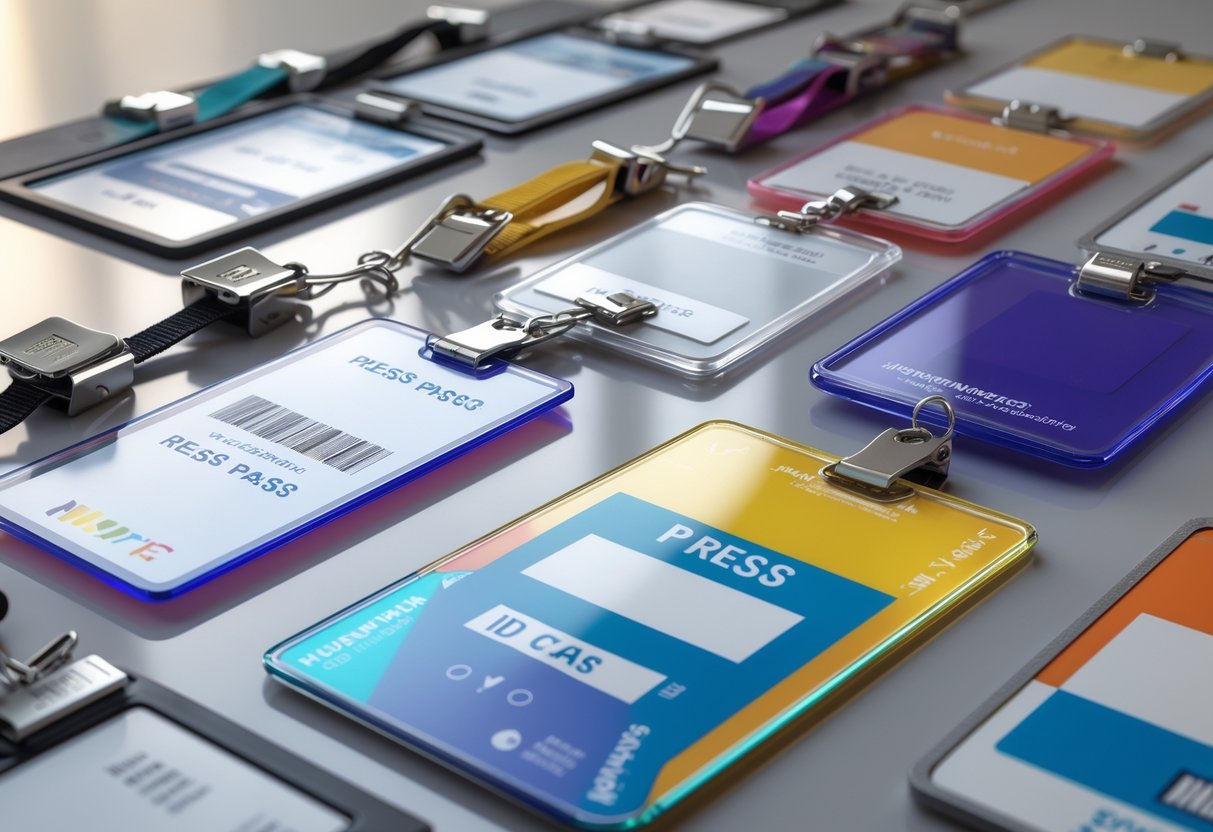
Press credentials come in all shapes and sizes. Some only cover one event. Others work year-round for regular reporting, and a few international IDs give global recognition.
Event-Specific Press Passes
Event-specific press passes give journalists temporary media credentials for particular occasions. These passes let reporters access individual conferences, tournaments, or public events.
Sports venues, conferences, and entertainment events usually hand out these passes. They’re valid only for specific dates and locations.
Common event-specific passes include:
- Conference media credentials
- Sports tournament access
- Entertainment venue passes
- Government briefing credentials
You’ll often find these passes easier to get than permanent credentials. Event organisers care more about your coverage plans than long-term qualifications.
Most event passes just need your publication name and assignment details. Some venues might also ask for work samples or your editor’s contact info.
Applying is usually pretty simple. Just reach out directly to the event’s media relations team and request accreditation.
Permanent and Annual Credentials
Permanent and annual press passes give journalists ongoing media access throughout the year. Government bodies, police departments, and major institutions usually issue these credentials.
Annual credentials often include:
- Government press gallery passes
- Police department credentials
- Court system media access
- Municipal government passes
Getting these passes takes more effort than event-specific ones. Applicants have to show regular journalism work and professional standing.
Many permanent credentials need renewing every one or two years. To renew, you’ll have to provide updated work samples and confirm your current employment.
Professional organisations like the National Writers Union offer press credentials to members who qualify. These passes help freelancers get access when they don’t have newsroom backing.
You’ll typically need to show proof of ongoing publication and income from journalism.
International Press IDs
International press cards give working journalists global recognition. These credentials are for reporters who travel or cover international events.
The International Federation of Journalists hands out international press cards in over 130 countries. They use standardised formats that officials around the world recognise.
International press ID benefits include:
- Recognition at border crossings
- Access to international events
- Protection under press freedom laws
- Professional credibility abroad
The application process is strict. Journalists need to prove regular international work or a real need for global credentials.
Most international press cards cost between £50 and £150 a year. If you cover international stories often, the investment is worth it.
Some cards even come with extra protections like legal help or insurance while working abroad.
Media Credentialing Practices
Media credentialing can get complicated, with lots of verification steps to decide which journalists get access to events and locations. About one in five credential applications gets denied. Freelancers and photographers seem to have it toughest.
Verification and Approval Processes
Most credentialing organisations use several steps to verify applicants. They check your employment status, publication history, and editorial independence.
Staff journalists generally need:
- A letter from their editor or news director
- Recent work samples from their publication
- Valid press ID from their employer
Freelancers have to meet tougher requirements:
- A portfolio of published articles
- Assignment letters from editors
- Proof of regular publication in recognised outlets
The American Bar Association asks for credentials at least three days before an event. They sometimes offer temporary access if you can’t meet all the usual requirements.
Bloggers and citizen journalists need to represent “well-established outlets,” at least in the eyes of media relations staff.
Common Challenges and Gatekeeping
No central credentialing office exists in the United States. Each organisation sets its own rules, which creates confusion for journalists.
Photographers get denied more often than writers. Many events limit photo access because of space and commercial deals.
Activists who also work as journalists get extra scrutiny. Credentialing bodies often question whether they’re truly objective.
Federal, state, and local organisations all use different criteria. What gets you into a city council meeting might not work for a federal event.
Private organisations make their own calls about credentials. They tend to favour established media outlets over independents.
Study Findings on Denial Rates
The Digital Media Law Project at Harvard and the Journalist’s Resource project at Harvard Kennedy School ran a big study on US media credentialing.
They surveyed more than 1,300 journalists between 2008 and 2013. Their findings showed big differences in approval rates.
Key statistics:
- 20% of all applicants got denied at least once
- Freelancers had much lower approval rates than staff journalists
- Photographers saw higher rejection rates across the board
Traditional employment models still shape who gets access. Independent journalists often struggle, even when their work is solid.
Credentialing practices haven’t kept up with changes in the media world. Plenty of qualified journalists get shut out just because they don’t work in a traditional newsroom.
Access Rights and Legal Considerations
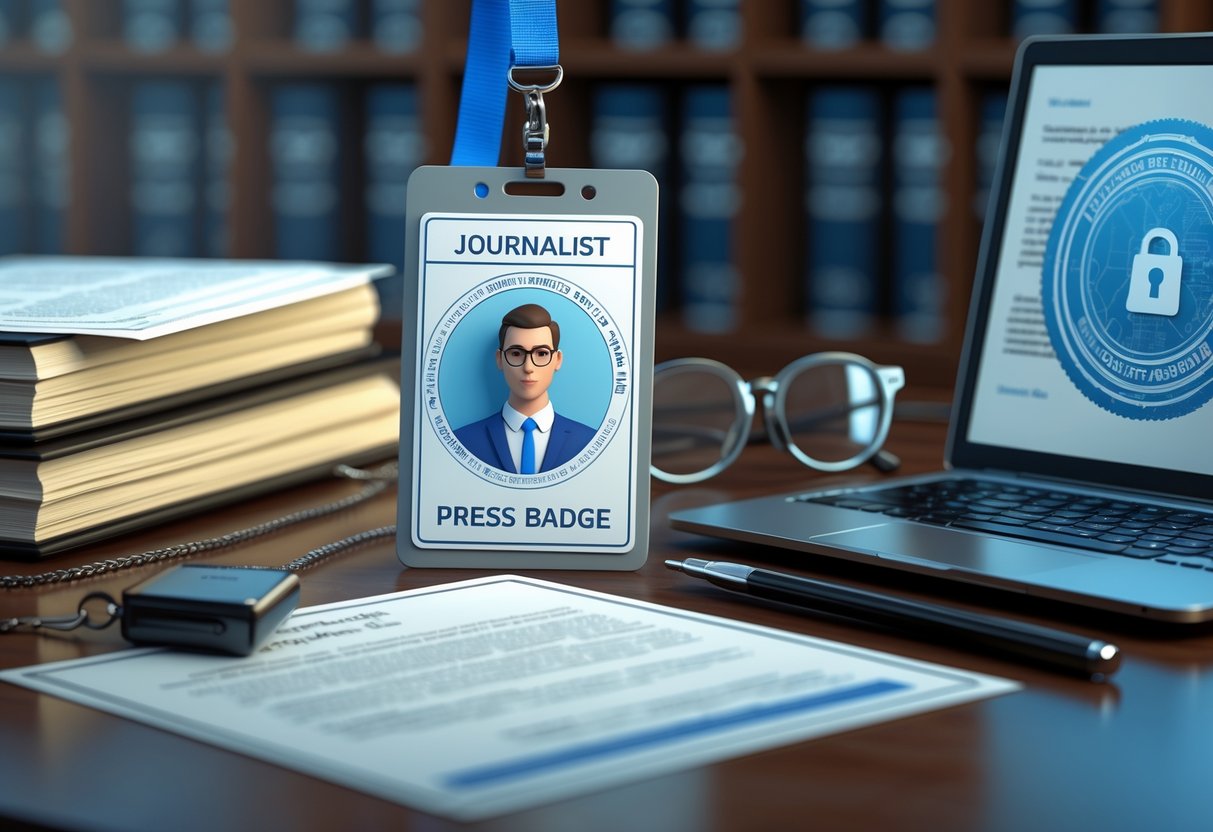
Journalists deal with some tricky legal rules when trying to access events and information. Press credentials can decide whether you get into government meetings, restricted areas, or can request official documents under freedom of information laws.
Access to Government and Private Events
Getting into government events is different from private ones. For government meetings, open meetings laws usually give us stronger legal footing.
Most government agencies have formal credential processes. You’ll need to apply ahead of time and show you’re a working journalist. This might mean submitting published articles, employment letters, or samples of your reporting.
Government access typically includes:
- Council meetings
- Court proceedings
- Legislative sessions
- Public hearings
Private events play by their own rules. Companies and organisations decide who gets in, and they can deny credentials for any reason.
Sports venues, conferences, and private ceremonies often have strict policies. Some only credential journalists from big outlets. Others want proof you’ve covered their industry before.
Common private event restrictions:
- Limited number of press passes
- Insurance requirements
- Equipment restrictions
- Background checks
Open Meetings Laws and Freedom of Information Acts
Open meetings laws and Freedom of Information Acts give journalists tools to access information and meetings. Every state requires government bodies to hold most meetings in public.
Open meetings laws cover city councils, school boards, and planning committees. Agencies can only meet privately for specific reasons, like legal strategy or personnel matters.
Freedom of Information Acts let us request government documents—emails, reports, contracts, and more. Agencies have to respond within a set time, usually 5 to 20 days.
Key FOIA considerations:
- Some info stays confidential (national security, privacy)
- Agencies can charge copying fees
- You can appeal denied requests
- Electronic records count the same as paper ones
A lot of journalists don’t know these laws as well as they could. Learning the rules in your area makes it easier to push back if agencies deny access.
Constitutional Rights of Access
The First Amendment gives journalists some constitutional protection for accessing information. Courts have recognised a qualified right of access to certain government proceedings.
This right covers criminal trials, civil court cases, and some administrative hearings. The default is open access unless there’s a good reason to close things off.
Constitutional access applies to:
- Most criminal proceedings
- Civil trials (with exceptions)
- Sentencing hearings
- Some administrative proceedings
The right isn’t absolute. Courts can restrict access for national security, protecting victims, or ensuring fairness. These restrictions have to be as narrow as possible.
Press credentials don’t create constitutional rights. They’re tools to help manage access. Having credentials makes things easier, but not having them doesn’t erase your rights.
Important limitations:
- No constitutional right to all government meetings
- Private events can exclude the press
- Access rights change depending on the proceeding
- Security concerns can override press access sometimes
Freelancers and Press Accreditation
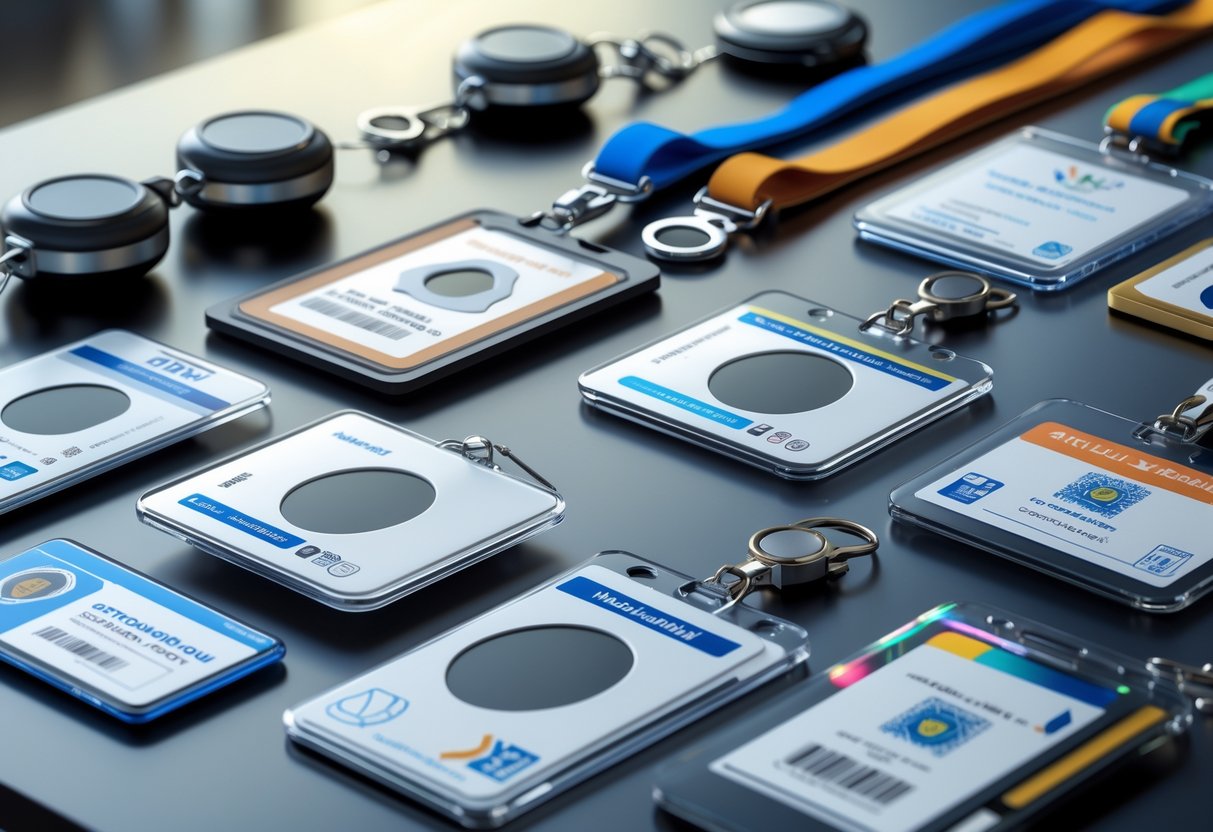
Freelance journalists face unique challenges when seeking press credentials. Denial rates are much higher for freelancers compared to those with established media jobs. Still, some organisations now offer accreditation paths designed for independents.
Barriers Facing Freelance Journalists
Freelancers deal with a lot of discrimination in the credential process. Studies show they’re far more likely to be denied press passes than staff reporters.
Primary rejection reasons include:
- No backing from a recognised news organisation
- Irregular publication schedules or thin portfolios
- Small audience reach
- Perceived lack of editorial oversight
Photographers have it even tougher. Many credentialing bodies see them as less important than writers, even though both need the same access.
Event organisers often question:
- Portfolio quality and professionalism
- Equipment investment and technical skills
- Past event coverage experience
- Social media following or audience size
Freelancers who identify as activists face the most rejections. Credentialing bodies often mistake advocacy journalism for bias, which blocks legitimate reporters from covering social issues.
Because credentialing is so decentralised, standards vary wildly. Each organisation makes its own rules, so requirements change from event to event.
Overcoming Denial and Building Credibility
Building a strong portfolio is key for freelancers applying for credentials. Keep detailed records of your published work across platforms.
Essential documentation includes:
- Published articles and circulation stats
- Editor references and contact info
- Professional photography samples
- Social media engagement numbers
Consistent publishing shows professionalism. Try to contribute regularly, even if you work with different outlets.
How you present yourself matters. Use official letterheads, business cards, and formal emails when applying.
Application best practices:
- Apply well before events
- Mention specific coverage plans and story angles
- Show evidence of your audience reach
- Offer to provide post-event coverage
Building relationships with editors and other journalists can help. References from established professionals often carry more weight than just your portfolio.
Joining professional journalism associations adds legitimacy. Membership in groups like the National Union of Journalists can help your applications stand out.
Recommended Organisations for Freelancers
US Press Association (USPA) offers internationally recognised credentials for media professionals. They accept writers, photographers, videographers, and digital creators.
Members get official press passes, accreditation letters, and ID cards. The organisation has thousands of members worldwide.
National Writers Union (NWU) supports freelance writers and photographers seeking press credentials. You’ll need to show you’re a professional journalist.
NWU membership opens doors to events usually reserved for staff reporters.
Freelance Journalist Association (FJA) provides verified press cards for independent journalists. Their credentials help freelancers get recognised and access events.
They focus on supporting career development for a range of media professionals.
Digital-focused alternatives like Camerapixo Press recognise YouTubers, bloggers, and social media journalists, not just traditional reporters.
These organisations get that the media world is changing and offer credentials for new journalism formats.
Photographers and Videographers: Special Considerations
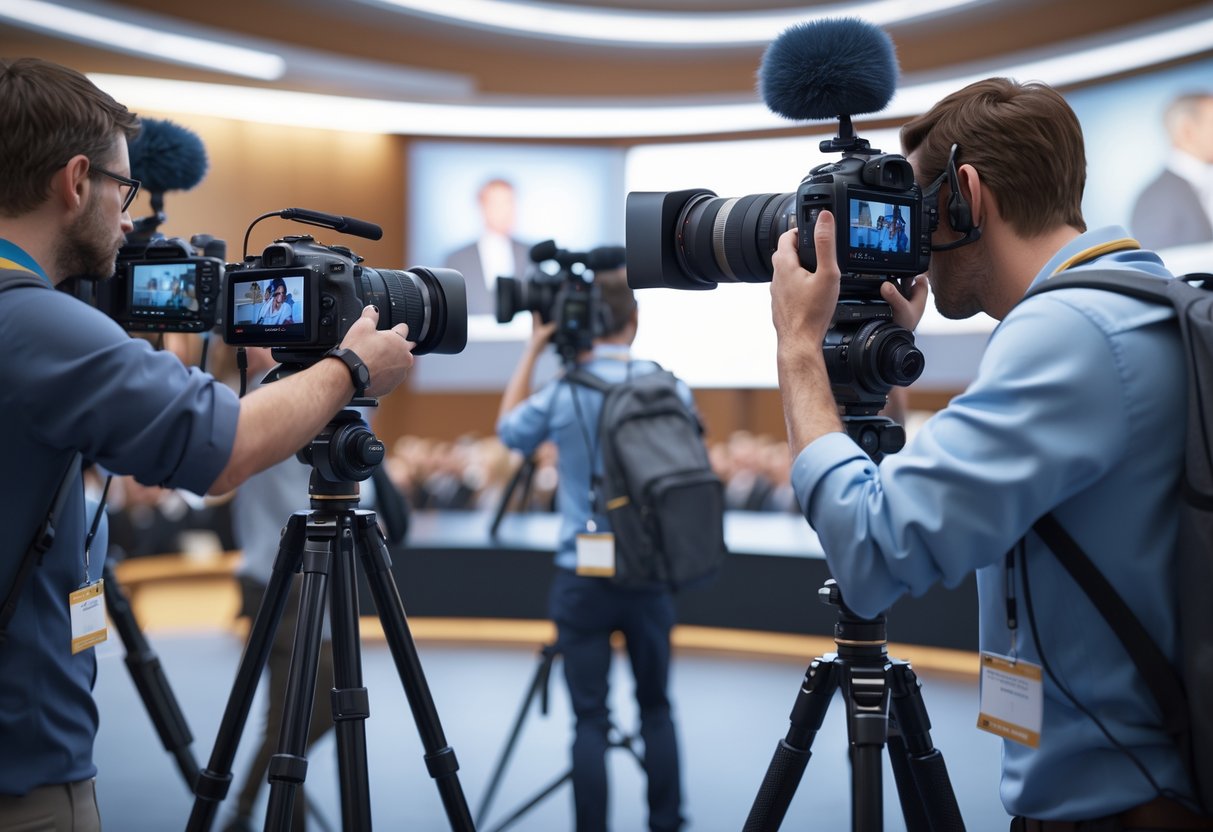
Photographers and videographers run into unique obstacles when applying for press credentials. Denial rates are higher, and equipment rules can be strict. Getting prime shooting positions often means you need specialised pit passes, not just a standard media badge.
Credentialing Challenges Unique to Visual Media
Visual media professionals hit barriers that writers usually don’t face. Studies show photographers get denied press credentials more often than writers.
Equipment restrictions are a top complaint. Event organisers might limit lens lengths, ban flash, or cap video recording times. Some venues even ban professional cameras, so photographers have to make do with basic gear.
Portfolio requirements change from place to place. Some credentialing bodies accept smartphone photos, while others want published work in major outlets. Groups like the US Press Association help freelancers bridge these gaps.
Freelance discrimination hits visual media professionals hard. Staff photographers from big outlets get priority, while independents fight for the few spots left. Many events save front-row access for wire services and major publications.
Insurance and liability add more hurdles. Some venues require photographers to carry professional liability insurance, which can get expensive for freelancers.
Event Access, Pit Passes, and Front Row Credentials
Standard press passes don’t always get you the best shooting spots. Pit passes open up stage-front areas at concerts and sporting events, but organisers hand these out pretty selectively.
Tiered access systems create a pecking order among credentialed photographers. General media credentials might get you inside, but they often stick you in zones with lousy sightlines. If you want premium access, you’ll need to fill out extra applications and meet tougher requirements.
Competition for prime spots really heats up at big events. Photographers often show up hours in advance, even with all the right credentials, just to grab a good position. Some events even run lotteries for the most coveted spots.
Time limitations make things trickier. Venues usually limit photographers to the first three songs at concerts or just certain quarters during sports matches. The “three songs, no flash” rule is almost a given these days.
Special event credentials like backstage passes or athlete interview access need separate applications beyond the basic press pass. Building relationships with organisers and showing a track record of solid coverage can boost your chances of approval.
Media Credential Trends and Challenges

The journalism market is shifting fast, and that’s changing how press credentials get handed out—and to whom. Recent studies say one in five journalists has been denied credentials at least once. Freelancers and photographers seem to get rejected more often than staff reporters.
Diversity in the Journalism Market
Modern journalism isn’t just about newsrooms anymore. Freelance writers, independent bloggers, documentary filmmakers, and digital creators all want press access these days.
Freelancers hit more roadblocks. The Digital Media Law Project reports that freelance journalists are more than twice as likely to get denied credentials compared to those with regular jobs. That’s a real barrier for independent voices, especially those covering niche topics.
Photographers get turned away even more. The numbers show photographers are almost twice as likely as other journalists to be denied. That really limits visual storytelling at important events.
Groups most affected include:
- Independent documentary makers
- Community bloggers covering local issues
- Specialist trade publication writers
- Student journalists from university media programs
A lot of credentialing organisations still use outdated definitions of who counts as “legitimate” media. That leaves plenty of qualified journalists without the access they need to cover stories for their audiences.
Evolving Definitions of Journalists
Traditional gatekeepers still struggle to decide who actually counts as a journalist these days. It’s way more complicated than just “newspaper employee.”
Credentialing bodies set inconsistent standards. Some want full-time employment at recognised outlets. Others accept freelancers, but only if you’ve got a hefty portfolio. A few don’t really explain their criteria at all.
New media formats don’t fit the old rules. Podcast hosts, newsletter writers, and social media reporters often get left out by systems built for print and broadcast.
The Digital Media Law Project found that activists who call themselves journalists face more than double the denial rate of traditional reporters. That raises real questions about press freedom and who should get media access rights.
Common credentialing requirements look like this:
- Government agencies: Usually want official press cards from recognised organisations
- Private events: Sometimes accept bloggers with big followings
- Courts: Tend to stick to strict standards, often requiring traditional employment
Impact of Digital and Social Media
Digital platforms have totally changed how we consume and create news. That’s had a direct impact on media credentialing practices everywhere.
Social media blurs the lines. Citizen journalists often break big stories on Twitter before traditional outlets even show up. Still, credentialing bodies don’t always see social media reporters as “real” press.
Influencers are showing up in journalism spaces. Content creators with big audiences cover news events now too. Some people say they deserve access based on reach, not just traditional qualifications.
Digital-first outlets challenge the old system. Online publications might not have the institutional recognition credentialing bodies expect. That makes it tough for digital-native journalists to get access, even if they’re covering the same stories.
Technology changes how people get verified:
- Digital portfolios replace old-school clippings
- Online audience numbers become new credibility checks
- Social media presence can sway credentialing decisions
The credentialing system just hasn’t kept up with the digital world. Many organisations still use outdated application processes that favour traditional media over new digital formats.
Best Practices for Maintaining Journalist Credentials
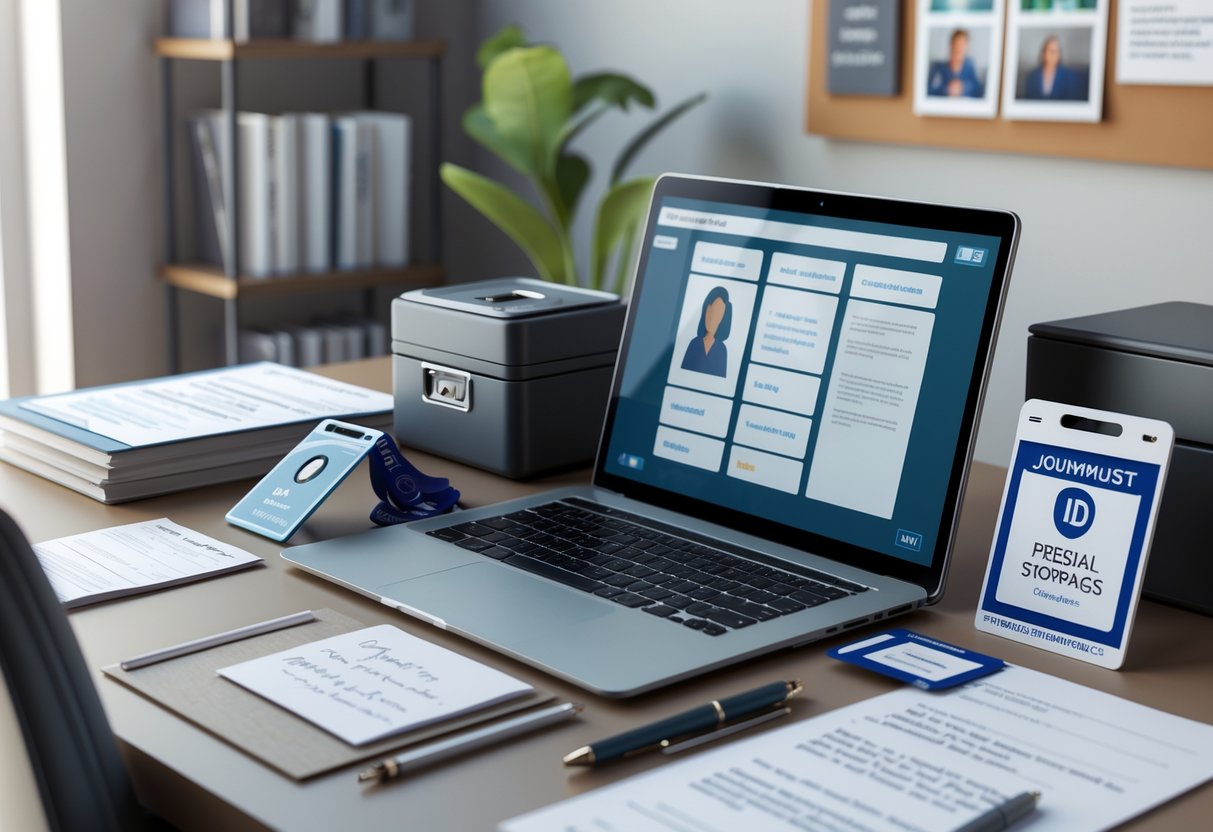
Keeping your press credentials valid means staying on top of renewal deadlines and professional standards. Most journalists who treat their press pass as both a privilege and a responsibility tend to keep them without issue.
Renewal and Validity Periods
Press credentials usually expire every 12 months, though some places only issue them for shorter stretches. It’s smart to set a calendar reminder at least a month before yours runs out.
Most credentialing bodies want proof that you’re actively working as a journalist when you renew. That usually means showing published articles, broadcast clips, or other recent work.
Typical renewal requirements:
- Portfolio of recent work (usually 5-10 pieces)
- Updated CV or professional profile
- Verification letter from your current employer
- Payment of annual renewal fees (often £50-£200)
Some organisations let you renew online, but others still want a paper application. Check with your credentialing body early, since processing can take a few weeks, especially during busy times.
Freelancers often have to meet stricter renewal standards than staff reporters. Keep detailed records of your published work to make renewal easier.
Ethical Use of Press Credentials
A press pass gives you access most people don’t have, so ethical behaviour is a must. Don’t use your credentials for personal gain or non-journalistic activities.
Don’t:
- Attend events just for fun
- Bring unauthorised guests
- Snap photos for personal social media
- Sell exclusive access to others
Always identify yourself as a journalist when using your credentials. Event organisers want to know who you’re with and what you’re covering.
Stick to photography and interview rules at events. Breaking these can get your credentials revoked fast, and it might hurt your chances next time.
We’ve seen journalists lose credentials for misrepresenting their role or publication. Always make sure your press pass matches your current job.
Protecting Your Professional Reputation
How you act with press credentials reflects on all journalists. Keep things professional, even during casual chats at events.
Dress for the occasion. Usually, smart casual works, but formal events might call for business attire. Skip clothing with big logos or political messages.
To protect your reputation:
- Meet deadlines for credential-required coverage
- Report accurately from credentialed events
- Respond quickly to media contacts
- Follow up if you promised coverage
Build good relationships with organisers and PR people. They often help decide if you get credentials in the future and can tip you off to good stories.
Document your professionalism through published work and positive feedback. These come in handy for renewals and job hunts.
Watch your social media, too. Avoid posts that could make you look biased or damage your credibility when covering events with credentials.
Frequently Asked Questions
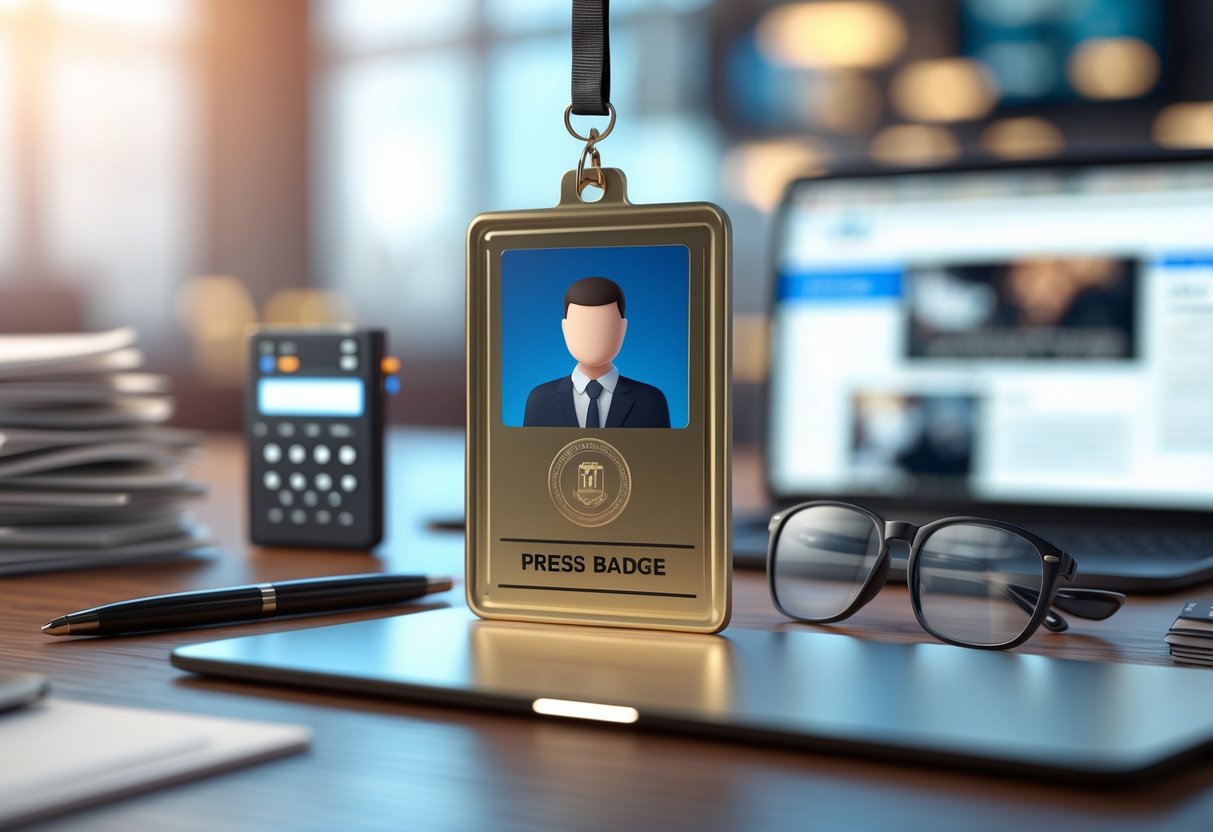
Getting press credentials brings up a lot of questions about eligibility, costs, and the application process—especially for freelancers, bloggers, and photographers. Most organisations accept applications from independent journalists if you can show active work in media.
How can one obtain a press pass as a freelance journalist?
Freelance journalists have a few ways to get credentials. You don’t need to work for a big media outlet.
Start by collecting your published work—articles, blog posts, anything that proves you’re active.
Apply through groups like the Freelance Journalist Association (FJA) or the US Press Association. They offer general press cards for freelancers, starting around £75.
You can also reach out to event organisers directly for specific events. Show them your portfolio and explain who you’re writing for.
What is the process for bloggers to acquire press credentials?
Bloggers with a solid body of work can get press credentials too. You’ll need to show you’re doing journalism, not just personal blogging.
Build a portfolio that highlights your event coverage, interviews, or news stories. Quality is more important than sheer volume.
Many credentialing organisations now see bloggers as legit media professionals. The application process is usually the same as for traditional journalists.
Some events might want proof of your audience size or a regular publishing schedule. Keep records of your blog’s traffic and posting frequency.
Could you guide me on how to secure a press pass for freelance photography?
Freelance photographers take similar steps as writers, but focus on visual journalism. Your portfolio should highlight event coverage, not just portraits or commercial shoots.
Reach out to event PR teams with published examples of your photography. Sports events, concerts, and conferences often need photo coverage.
Professional photography associations sometimes issue press credentials. Check with groups in your area or specialty.
Many photographers start by covering smaller local events. That builds a track record for bigger applications down the line.
Are there any options to obtain press credentials free of charge?
Event-specific press passes are usually free, but only good for one event. You get these directly from organisers.
Some journalism schools give student press credentials at no cost. They’re not always widely accepted, but they work for educational coverage.
A few nonprofit journalism groups offer free credentials to qualifying members. Look into local press clubs or journalism associations.
Most general press cards come with a fee, since they offer ongoing credibility and admin support. Expect to pay £75-£150 a year.
Which organisations are responsible for issuing press credentials?
A bunch of different organisations issue press credentials, depending on your needs. There’s no single authority for all media access.
Government bodies give out credentials for official events. Local councils, courts, and police departments have their own application systems.
Professional journalism associations like FJA and USPA offer general press cards. These work at a variety of venues and events.
Event organisers control access to their own events. Concert venues, sports leagues, and conference organisers all set their own rules.
Some private companies accept association-issued credentials, but others want you to apply directly through their PR departments.
What are the steps involved in submitting a press pass application?
Start by figuring out which type of credential you actually need. Event-specific passes? They usually want a different application than the general press cards.
Next, grab all the documents they ask for—photo ID, a couple of your work samples, maybe a letter from your editor. Every organization seems to have its own checklist.
Fill out the application form, and make sure everything you put down about your journalism work is accurate. If you’re newer or freelance, just be up front about your experience and where you publish.
They’ll probably ask for a fee, so pay that and upload your supporting materials. Most places say it takes about 5-7 business days, but honestly, it can vary.
If you don’t hear anything back by then, send a quick follow-up. Some organizations get swamped and need a nudge.

